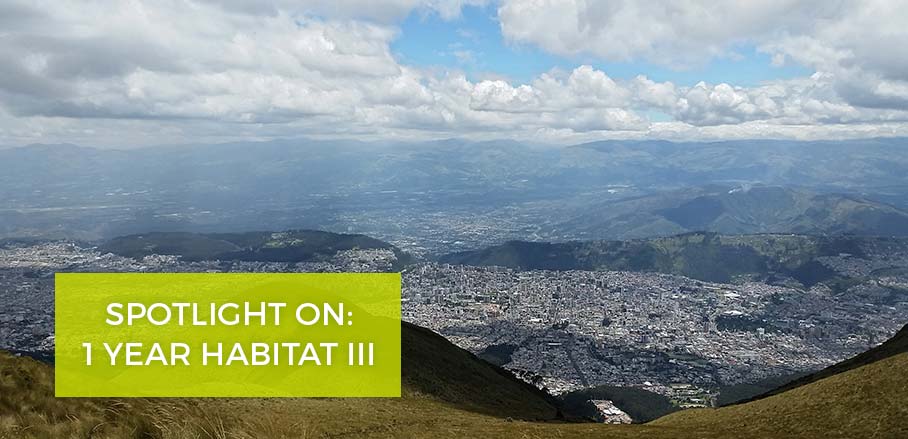Sustainable development in the metropolitan century: where do we stand one year after Habitat III?
By Ravi Jayaweera and Verena Goranko
One year has passed since the historic adoption of the New Urban Agenda, two since the adoption of the 2030 Agenda. Is the implementation of the agendas on track? What are obstacles and how can we improve the process?
The Metropolitan Revolution
Urbanisation is a megatrend that significantly shapes the economic, political and social transformation of societies and their spatial and environmental impacts. However, the face of cities is changing: Cities are expanding, moving closer to each other and are increasingly linked to their peri-urban and rural hinterland – be it through two-way flows of people, goods, capital, information or resources. Metropolitan regions are emerging, calling for new governance approaches that productively consolidate these formerly separated or sometimes competing areas. Stronger coordination and cooperation is required. Territorial approaches have to be developed that fit the needs of the metropolitan 21st century and promote integrated city-regional planning, financing and implementation. Competing demands for space, natural resources and investments need to be matched, weighed and balanced according to overarching development goals, such as social cohesion, prosperity and environmental protection
The New Urban Agenda, which was adopted one year ago in Quito at the Habitat III conference, aims to “implement effective local and metropolitan multilevel governance, across administrative borders, and based on functional territories” (NUA §90). The territorial approach is also highlighted in the 2030 Agenda, supporting “economic, social and environmental links between urban, peri-urban and rural areas” (SDG 11.a).
Implementing the SDGs and the NUA at the metropolitan level
In many sectors, sustainable solutions can only be fulfilled if rural-urban linkages and some forms of metropolitan governance are embraced. By joining forces, metropolitan municipalities can achieve crucial benefits in terms of increasing efficiency in the delivery of basic services, reducing costs (through economies of scale and joint investments), balancing regional disparities and overcoming fragmentation as well as inequality. Municipalities can thus significantly contribute to implementing the NUA and achieving the SDGs, expanding far beyond Goal 11.
Today’s challenges such as climate change, excessive resource and energy consumption, food insecurity, poverty, massive traffic jams and unsustainable transport, water scarcity and production of tons of waste cannot be countered with solutions that stop at the border of cities and sectoral departments. However, there are few metropolitan bodies with a clear mandate to take the lead on governance issues at the metropolitan level – across sectors, actors and spaces.
Metropolitan initiatives for sustainable development
Nevertheless, positive developments can be recorded. In Brazil, for example, urban areas are characterized not by individual cities but as metropolitan regions, often grouping together millions of citizens across the borders of multiple municipal governments. In 2015, the Statute of the Metropolis defined shared responsibilities between cities and states under a coordinated mechanism, including participation of civil society, and encourages cooperation in a number of sectors. It also requires that each of the 90 metropolitan regions develop Integrated Urban Development Plans (PDUI) by January 2018.
The Deutsche Gesellschaft für Internationale Zusammenarbeit (GIZ) GmbH, in cooperation with SDSN Brazil, the Metropolitan Chamber of Rio de Janeiro and the civil society organisation Casa Fluminense, supported a nationwide initiative on implementing and monitoring the SDGs in metropolitan areas in Brazil. A Book of Practices (available in Portuguese and English) was developed to offer a systematized overview over different monitoring approaches, ranging from traditional to alternative data sources, collection mechanisms and analysis processes to measure local level SDG performance. It provides guidance to local and metropolitan stakeholders on how to translate the 2030 Agenda to the local context and discusses how SDG monitoring can be used as a trigger for promoting inter-municipal and metropolitan cooperation. The report shall serve as inspirational reference and hands-on guidance for policy makers and local government representatives committed to fulfilling the SDGs – in other parts of Latin America and beyond.
Several other metropolitan initiatives are being developed at supra- and international levels with GIZ as a key partner: UN-Habitat launched the MetroHUB initiative as a platform for implementing the global agendas at the metropolitan scale. MetroHUB aims to combine planning, governance and finance elements with socio-ecologic development, capacity development and strategic project planning (“acupuncture projects”). Moreover, the International Network on Urban Rural Linkages is currently being set up by an alliance of FAO, IFAD, UN-Habitat, RUAF and GIZ. The network will be officially launched at the World Urban Forum in February 2018, and will serve as an international reference point for integrated territorial development.
The GIZ Sector Project Sustainable Development of Metropolitan Regions aims to support local governments, development experts and practitioners to foster metropolitan cooperation and to implement global agendas at the city-regional level. Together with international partners, the Sector Project has developed tools, capacity development trainings as well as a broad range of expert reports and case studies. It promotes integrated solutions in a multi-level, multi-actor, cross-sectoral and cross-jurisdictional way. One example for cross-sectoral project management is the Urban Nexus approach that promotes integrated resource efficiency in cities, addressing primarily water, food and energy.
Are you interested in integrated territorial approaches, more details or collaborating with us?
Contact us via: Metropolregionen@giz.de.
